Examining Contextual Approaches: Identifying Health Determinants
VerifiedAdded on 2023/01/07
|11
|3843
|91
Essay
AI Summary
This essay critically examines the validity of contextual approaches in understanding health, contrasting them with reductive psychodynamic assessments. It emphasizes that behavior occurs within specific contexts, considering the relationship between individuals and their cognitive, physical, and social worlds. The discussion covers the World Health Organization's definition of health, emphasizing mental, physical, and social well-being, and explores socio-cultural and environmental factors influencing health. It highlights the significance of health behaviors, clinical care, socioeconomic factors, and the physical environment in determining health outcomes. The essay also addresses the importance of evidence-based healthcare practices and the challenges in implementing contextual approaches, including potential failures to relate contextual variables effectively. The study concludes by stating that contextual approaches are useful in overcoming reductionist tendencies among researchers in healthcare.
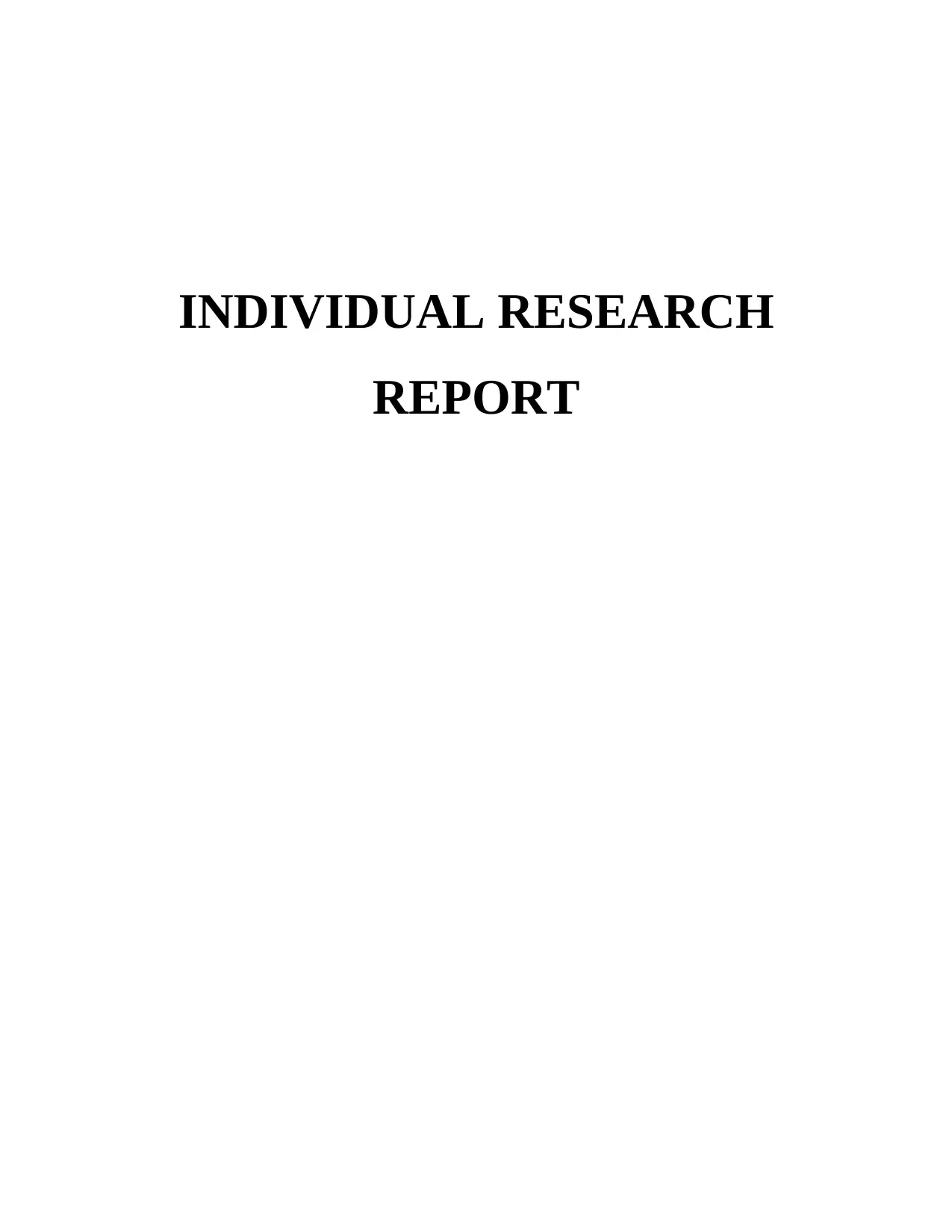
INDIVIDUAL RESEARCH
REPORT
REPORT
Paraphrase This Document
Need a fresh take? Get an instant paraphrase of this document with our AI Paraphraser
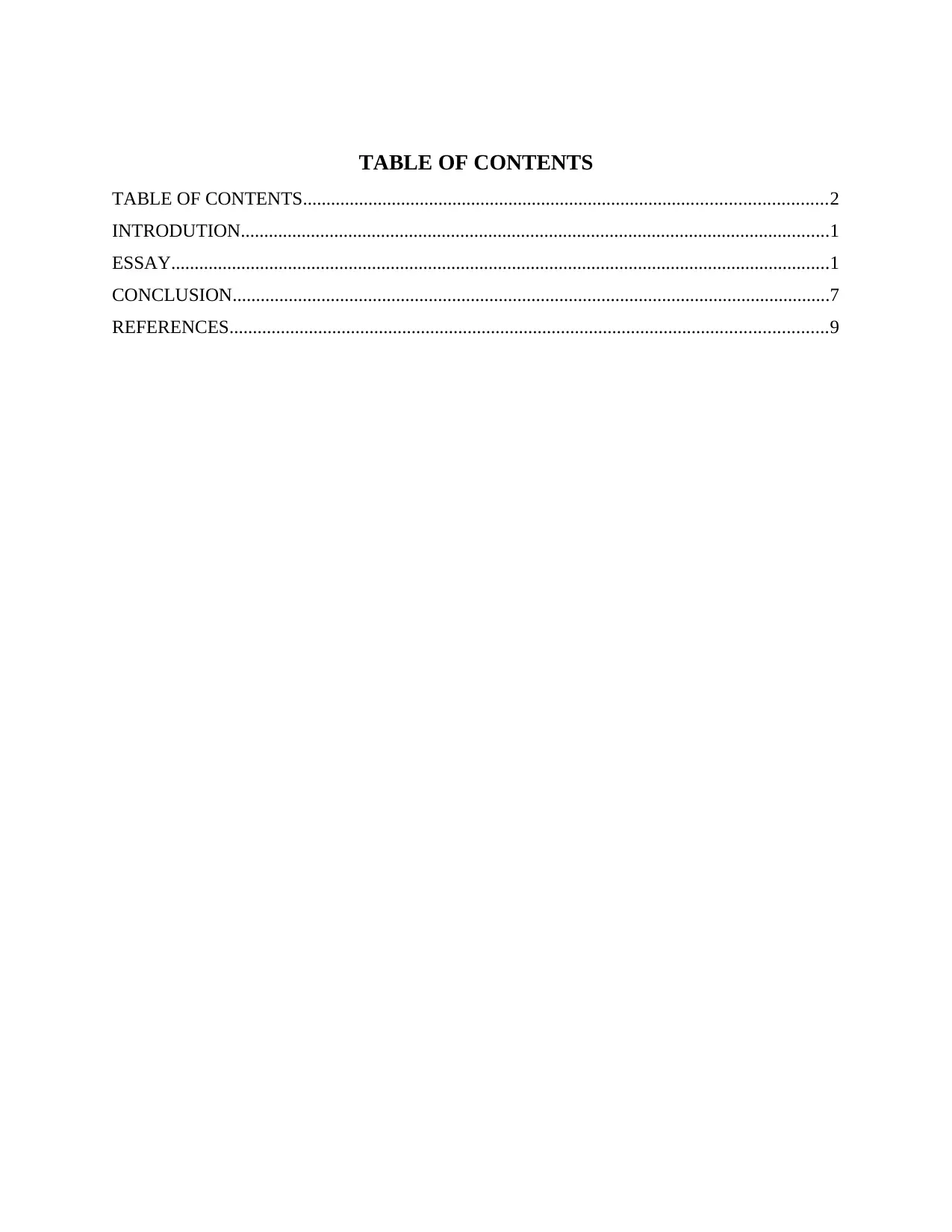
TABLE OF CONTENTS
TABLE OF CONTENTS................................................................................................................2
INTRODUTION..............................................................................................................................1
ESSAY.............................................................................................................................................1
CONCLUSION................................................................................................................................7
REFERENCES................................................................................................................................9
TABLE OF CONTENTS................................................................................................................2
INTRODUTION..............................................................................................................................1
ESSAY.............................................................................................................................................1
CONCLUSION................................................................................................................................7
REFERENCES................................................................................................................................9
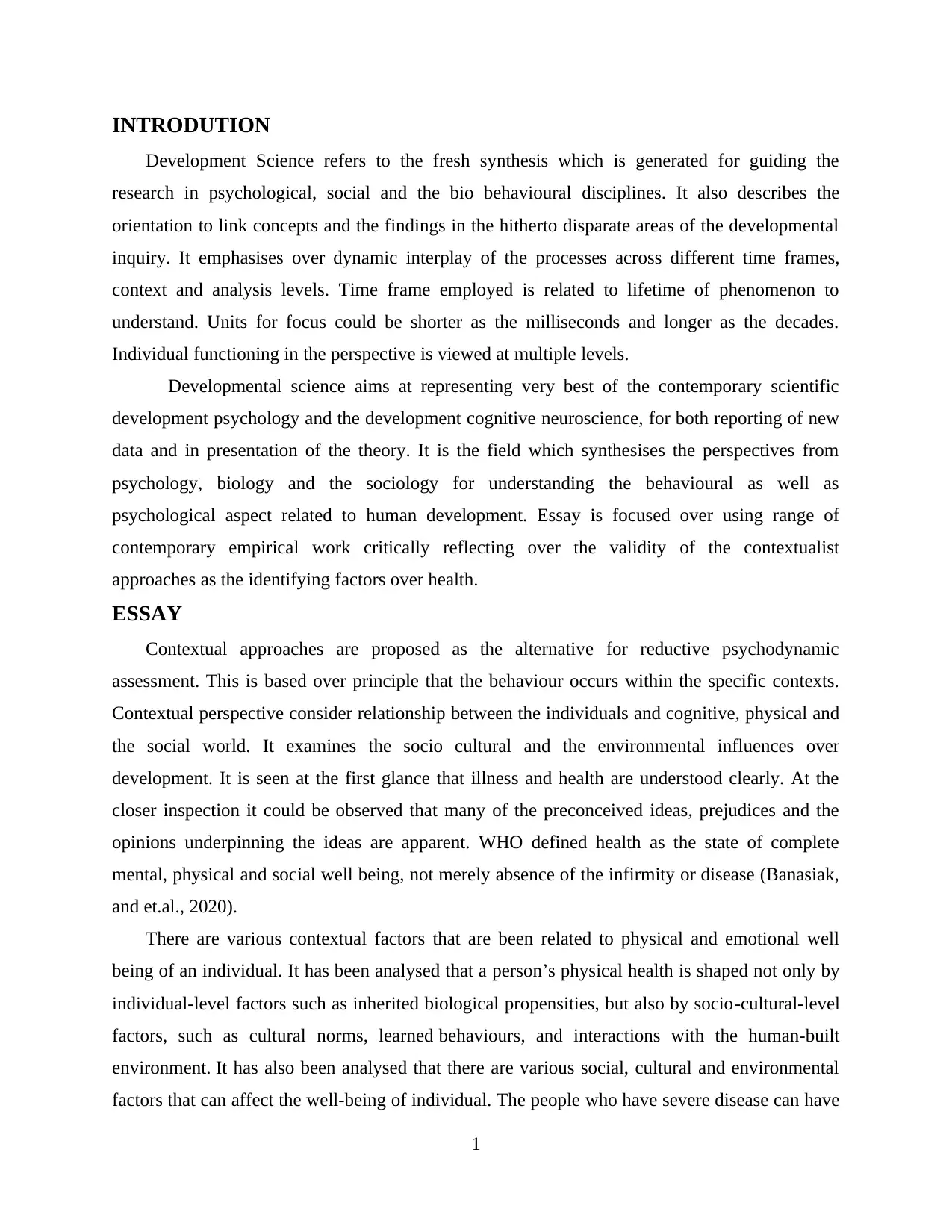
INTRODUTION
Development Science refers to the fresh synthesis which is generated for guiding the
research in psychological, social and the bio behavioural disciplines. It also describes the
orientation to link concepts and the findings in the hitherto disparate areas of the developmental
inquiry. It emphasises over dynamic interplay of the processes across different time frames,
context and analysis levels. Time frame employed is related to lifetime of phenomenon to
understand. Units for focus could be shorter as the milliseconds and longer as the decades.
Individual functioning in the perspective is viewed at multiple levels.
Developmental science aims at representing very best of the contemporary scientific
development psychology and the development cognitive neuroscience, for both reporting of new
data and in presentation of the theory. It is the field which synthesises the perspectives from
psychology, biology and the sociology for understanding the behavioural as well as
psychological aspect related to human development. Essay is focused over using range of
contemporary empirical work critically reflecting over the validity of the contextualist
approaches as the identifying factors over health.
ESSAY
Contextual approaches are proposed as the alternative for reductive psychodynamic
assessment. This is based over principle that the behaviour occurs within the specific contexts.
Contextual perspective consider relationship between the individuals and cognitive, physical and
the social world. It examines the socio cultural and the environmental influences over
development. It is seen at the first glance that illness and health are understood clearly. At the
closer inspection it could be observed that many of the preconceived ideas, prejudices and the
opinions underpinning the ideas are apparent. WHO defined health as the state of complete
mental, physical and social well being, not merely absence of the infirmity or disease (Banasiak,
and et.al., 2020).
There are various contextual factors that are been related to physical and emotional well
being of an individual. It has been analysed that a person’s physical health is shaped not only by
individual-level factors such as inherited biological propensities, but also by socio-cultural-level
factors, such as cultural norms, learned behaviours, and interactions with the human-built
environment. It has also been analysed that there are various social, cultural and environmental
factors that can affect the well-being of individual. The people who have severe disease can have
1
Development Science refers to the fresh synthesis which is generated for guiding the
research in psychological, social and the bio behavioural disciplines. It also describes the
orientation to link concepts and the findings in the hitherto disparate areas of the developmental
inquiry. It emphasises over dynamic interplay of the processes across different time frames,
context and analysis levels. Time frame employed is related to lifetime of phenomenon to
understand. Units for focus could be shorter as the milliseconds and longer as the decades.
Individual functioning in the perspective is viewed at multiple levels.
Developmental science aims at representing very best of the contemporary scientific
development psychology and the development cognitive neuroscience, for both reporting of new
data and in presentation of the theory. It is the field which synthesises the perspectives from
psychology, biology and the sociology for understanding the behavioural as well as
psychological aspect related to human development. Essay is focused over using range of
contemporary empirical work critically reflecting over the validity of the contextualist
approaches as the identifying factors over health.
ESSAY
Contextual approaches are proposed as the alternative for reductive psychodynamic
assessment. This is based over principle that the behaviour occurs within the specific contexts.
Contextual perspective consider relationship between the individuals and cognitive, physical and
the social world. It examines the socio cultural and the environmental influences over
development. It is seen at the first glance that illness and health are understood clearly. At the
closer inspection it could be observed that many of the preconceived ideas, prejudices and the
opinions underpinning the ideas are apparent. WHO defined health as the state of complete
mental, physical and social well being, not merely absence of the infirmity or disease (Banasiak,
and et.al., 2020).
There are various contextual factors that are been related to physical and emotional well
being of an individual. It has been analysed that a person’s physical health is shaped not only by
individual-level factors such as inherited biological propensities, but also by socio-cultural-level
factors, such as cultural norms, learned behaviours, and interactions with the human-built
environment. It has also been analysed that there are various social, cultural and environmental
factors that can affect the well-being of individual. The people who have severe disease can have
1
⊘ This is a preview!⊘
Do you want full access?
Subscribe today to unlock all pages.

Trusted by 1+ million students worldwide
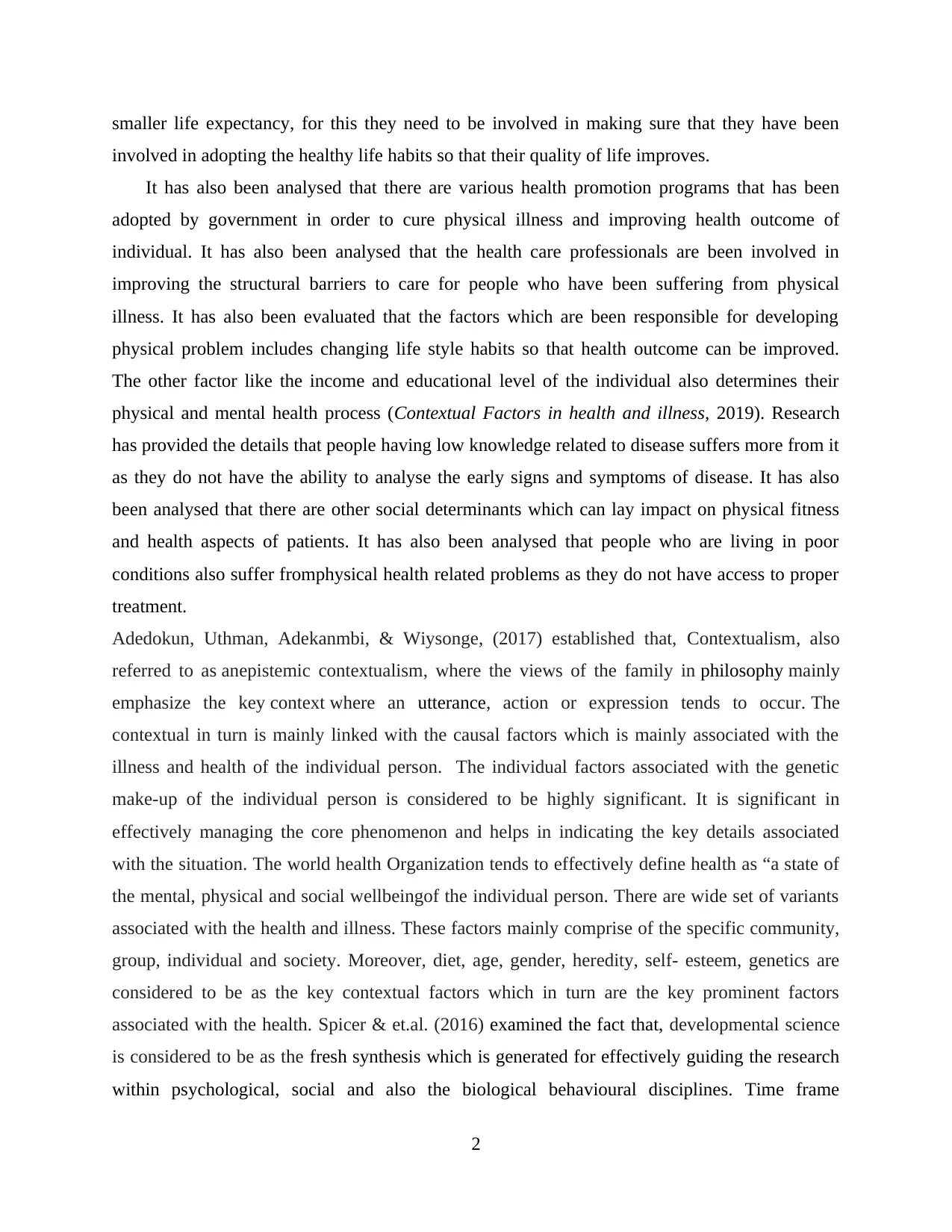
smaller life expectancy, for this they need to be involved in making sure that they have been
involved in adopting the healthy life habits so that their quality of life improves.
It has also been analysed that there are various health promotion programs that has been
adopted by government in order to cure physical illness and improving health outcome of
individual. It has also been analysed that the health care professionals are been involved in
improving the structural barriers to care for people who have been suffering from physical
illness. It has also been evaluated that the factors which are been responsible for developing
physical problem includes changing life style habits so that health outcome can be improved.
The other factor like the income and educational level of the individual also determines their
physical and mental health process (Contextual Factors in health and illness, 2019). Research
has provided the details that people having low knowledge related to disease suffers more from it
as they do not have the ability to analyse the early signs and symptoms of disease. It has also
been analysed that there are other social determinants which can lay impact on physical fitness
and health aspects of patients. It has also been analysed that people who are living in poor
conditions also suffer fromphysical health related problems as they do not have access to proper
treatment.
Adedokun, Uthman, Adekanmbi, & Wiysonge, (2017) established that, Contextualism, also
referred to as anepistemic contextualism, where the views of the family in philosophy mainly
emphasize the key context where an utterance, action or expression tends to occur. The
contextual in turn is mainly linked with the causal factors which is mainly associated with the
illness and health of the individual person. The individual factors associated with the genetic
make-up of the individual person is considered to be highly significant. It is significant in
effectively managing the core phenomenon and helps in indicating the key details associated
with the situation. The world health Organization tends to effectively define health as “a state of
the mental, physical and social wellbeingof the individual person. There are wide set of variants
associated with the health and illness. These factors mainly comprise of the specific community,
group, individual and society. Moreover, diet, age, gender, heredity, self- esteem, genetics are
considered to be as the key contextual factors which in turn are the key prominent factors
associated with the health. Spicer & et.al. (2016) examined the fact that, developmental science
is considered to be as the fresh synthesis which is generated for effectively guiding the research
within psychological, social and also the biological behavioural disciplines. Time frame
2
involved in adopting the healthy life habits so that their quality of life improves.
It has also been analysed that there are various health promotion programs that has been
adopted by government in order to cure physical illness and improving health outcome of
individual. It has also been analysed that the health care professionals are been involved in
improving the structural barriers to care for people who have been suffering from physical
illness. It has also been evaluated that the factors which are been responsible for developing
physical problem includes changing life style habits so that health outcome can be improved.
The other factor like the income and educational level of the individual also determines their
physical and mental health process (Contextual Factors in health and illness, 2019). Research
has provided the details that people having low knowledge related to disease suffers more from it
as they do not have the ability to analyse the early signs and symptoms of disease. It has also
been analysed that there are other social determinants which can lay impact on physical fitness
and health aspects of patients. It has also been analysed that people who are living in poor
conditions also suffer fromphysical health related problems as they do not have access to proper
treatment.
Adedokun, Uthman, Adekanmbi, & Wiysonge, (2017) established that, Contextualism, also
referred to as anepistemic contextualism, where the views of the family in philosophy mainly
emphasize the key context where an utterance, action or expression tends to occur. The
contextual in turn is mainly linked with the causal factors which is mainly associated with the
illness and health of the individual person. The individual factors associated with the genetic
make-up of the individual person is considered to be highly significant. It is significant in
effectively managing the core phenomenon and helps in indicating the key details associated
with the situation. The world health Organization tends to effectively define health as “a state of
the mental, physical and social wellbeingof the individual person. There are wide set of variants
associated with the health and illness. These factors mainly comprise of the specific community,
group, individual and society. Moreover, diet, age, gender, heredity, self- esteem, genetics are
considered to be as the key contextual factors which in turn are the key prominent factors
associated with the health. Spicer & et.al. (2016) examined the fact that, developmental science
is considered to be as the fresh synthesis which is generated for effectively guiding the research
within psychological, social and also the biological behavioural disciplines. Time frame
2
Paraphrase This Document
Need a fresh take? Get an instant paraphrase of this document with our AI Paraphraser
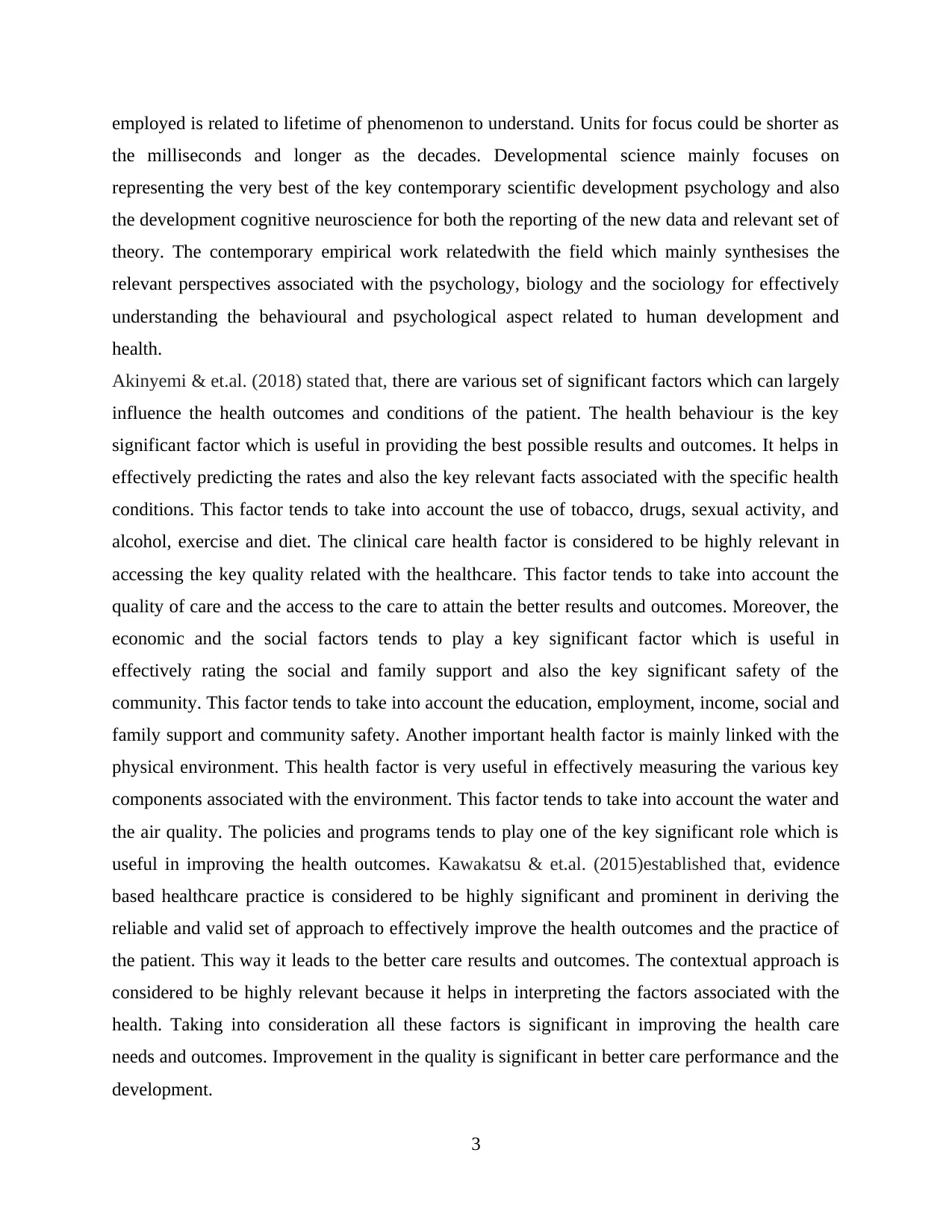
employed is related to lifetime of phenomenon to understand. Units for focus could be shorter as
the milliseconds and longer as the decades. Developmental science mainly focuses on
representing the very best of the key contemporary scientific development psychology and also
the development cognitive neuroscience for both the reporting of the new data and relevant set of
theory. The contemporary empirical work relatedwith the field which mainly synthesises the
relevant perspectives associated with the psychology, biology and the sociology for effectively
understanding the behavioural and psychological aspect related to human development and
health.
Akinyemi & et.al. (2018) stated that, there are various set of significant factors which can largely
influence the health outcomes and conditions of the patient. The health behaviour is the key
significant factor which is useful in providing the best possible results and outcomes. It helps in
effectively predicting the rates and also the key relevant facts associated with the specific health
conditions. This factor tends to take into account the use of tobacco, drugs, sexual activity, and
alcohol, exercise and diet. The clinical care health factor is considered to be highly relevant in
accessing the key quality related with the healthcare. This factor tends to take into account the
quality of care and the access to the care to attain the better results and outcomes. Moreover, the
economic and the social factors tends to play a key significant factor which is useful in
effectively rating the social and family support and also the key significant safety of the
community. This factor tends to take into account the education, employment, income, social and
family support and community safety. Another important health factor is mainly linked with the
physical environment. This health factor is very useful in effectively measuring the various key
components associated with the environment. This factor tends to take into account the water and
the air quality. The policies and programs tends to play one of the key significant role which is
useful in improving the health outcomes. Kawakatsu & et.al. (2015)established that, evidence
based healthcare practice is considered to be highly significant and prominent in deriving the
reliable and valid set of approach to effectively improve the health outcomes and the practice of
the patient. This way it leads to the better care results and outcomes. The contextual approach is
considered to be highly relevant because it helps in interpreting the factors associated with the
health. Taking into consideration all these factors is significant in improving the health care
needs and outcomes. Improvement in the quality is significant in better care performance and the
development.
3
the milliseconds and longer as the decades. Developmental science mainly focuses on
representing the very best of the key contemporary scientific development psychology and also
the development cognitive neuroscience for both the reporting of the new data and relevant set of
theory. The contemporary empirical work relatedwith the field which mainly synthesises the
relevant perspectives associated with the psychology, biology and the sociology for effectively
understanding the behavioural and psychological aspect related to human development and
health.
Akinyemi & et.al. (2018) stated that, there are various set of significant factors which can largely
influence the health outcomes and conditions of the patient. The health behaviour is the key
significant factor which is useful in providing the best possible results and outcomes. It helps in
effectively predicting the rates and also the key relevant facts associated with the specific health
conditions. This factor tends to take into account the use of tobacco, drugs, sexual activity, and
alcohol, exercise and diet. The clinical care health factor is considered to be highly relevant in
accessing the key quality related with the healthcare. This factor tends to take into account the
quality of care and the access to the care to attain the better results and outcomes. Moreover, the
economic and the social factors tends to play a key significant factor which is useful in
effectively rating the social and family support and also the key significant safety of the
community. This factor tends to take into account the education, employment, income, social and
family support and community safety. Another important health factor is mainly linked with the
physical environment. This health factor is very useful in effectively measuring the various key
components associated with the environment. This factor tends to take into account the water and
the air quality. The policies and programs tends to play one of the key significant role which is
useful in improving the health outcomes. Kawakatsu & et.al. (2015)established that, evidence
based healthcare practice is considered to be highly significant and prominent in deriving the
reliable and valid set of approach to effectively improve the health outcomes and the practice of
the patient. This way it leads to the better care results and outcomes. The contextual approach is
considered to be highly relevant because it helps in interpreting the factors associated with the
health. Taking into consideration all these factors is significant in improving the health care
needs and outcomes. Improvement in the quality is significant in better care performance and the
development.
3
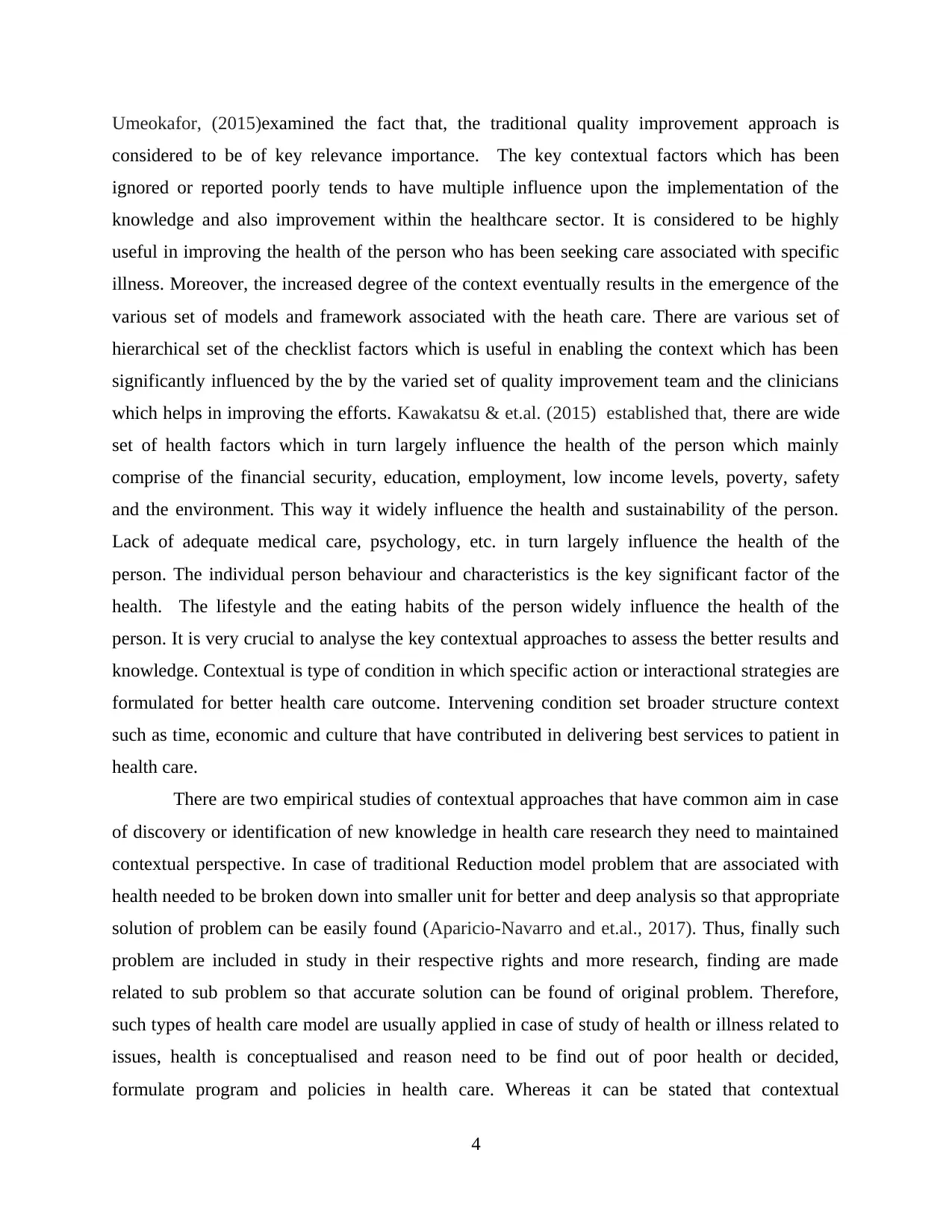
Umeokafor, (2015)examined the fact that, the traditional quality improvement approach is
considered to be of key relevance importance. The key contextual factors which has been
ignored or reported poorly tends to have multiple influence upon the implementation of the
knowledge and also improvement within the healthcare sector. It is considered to be highly
useful in improving the health of the person who has been seeking care associated with specific
illness. Moreover, the increased degree of the context eventually results in the emergence of the
various set of models and framework associated with the heath care. There are various set of
hierarchical set of the checklist factors which is useful in enabling the context which has been
significantly influenced by the by the varied set of quality improvement team and the clinicians
which helps in improving the efforts. Kawakatsu & et.al. (2015) established that, there are wide
set of health factors which in turn largely influence the health of the person which mainly
comprise of the financial security, education, employment, low income levels, poverty, safety
and the environment. This way it widely influence the health and sustainability of the person.
Lack of adequate medical care, psychology, etc. in turn largely influence the health of the
person. The individual person behaviour and characteristics is the key significant factor of the
health. The lifestyle and the eating habits of the person widely influence the health of the
person. It is very crucial to analyse the key contextual approaches to assess the better results and
knowledge. Contextual is type of condition in which specific action or interactional strategies are
formulated for better health care outcome. Intervening condition set broader structure context
such as time, economic and culture that have contributed in delivering best services to patient in
health care.
There are two empirical studies of contextual approaches that have common aim in case
of discovery or identification of new knowledge in health care research they need to maintained
contextual perspective. In case of traditional Reduction model problem that are associated with
health needed to be broken down into smaller unit for better and deep analysis so that appropriate
solution of problem can be easily found (Aparicio-Navarro and et.al., 2017). Thus, finally such
problem are included in study in their respective rights and more research, finding are made
related to sub problem so that accurate solution can be found of original problem. Therefore,
such types of health care model are usually applied in case of study of health or illness related to
issues, health is conceptualised and reason need to be find out of poor health or decided,
formulate program and policies in health care. Whereas it can be stated that contextual
4
considered to be of key relevance importance. The key contextual factors which has been
ignored or reported poorly tends to have multiple influence upon the implementation of the
knowledge and also improvement within the healthcare sector. It is considered to be highly
useful in improving the health of the person who has been seeking care associated with specific
illness. Moreover, the increased degree of the context eventually results in the emergence of the
various set of models and framework associated with the heath care. There are various set of
hierarchical set of the checklist factors which is useful in enabling the context which has been
significantly influenced by the by the varied set of quality improvement team and the clinicians
which helps in improving the efforts. Kawakatsu & et.al. (2015) established that, there are wide
set of health factors which in turn largely influence the health of the person which mainly
comprise of the financial security, education, employment, low income levels, poverty, safety
and the environment. This way it widely influence the health and sustainability of the person.
Lack of adequate medical care, psychology, etc. in turn largely influence the health of the
person. The individual person behaviour and characteristics is the key significant factor of the
health. The lifestyle and the eating habits of the person widely influence the health of the
person. It is very crucial to analyse the key contextual approaches to assess the better results and
knowledge. Contextual is type of condition in which specific action or interactional strategies are
formulated for better health care outcome. Intervening condition set broader structure context
such as time, economic and culture that have contributed in delivering best services to patient in
health care.
There are two empirical studies of contextual approaches that have common aim in case
of discovery or identification of new knowledge in health care research they need to maintained
contextual perspective. In case of traditional Reduction model problem that are associated with
health needed to be broken down into smaller unit for better and deep analysis so that appropriate
solution of problem can be easily found (Aparicio-Navarro and et.al., 2017). Thus, finally such
problem are included in study in their respective rights and more research, finding are made
related to sub problem so that accurate solution can be found of original problem. Therefore,
such types of health care model are usually applied in case of study of health or illness related to
issues, health is conceptualised and reason need to be find out of poor health or decided,
formulate program and policies in health care. Whereas it can be stated that contextual
4
⊘ This is a preview!⊘
Do you want full access?
Subscribe today to unlock all pages.

Trusted by 1+ million students worldwide
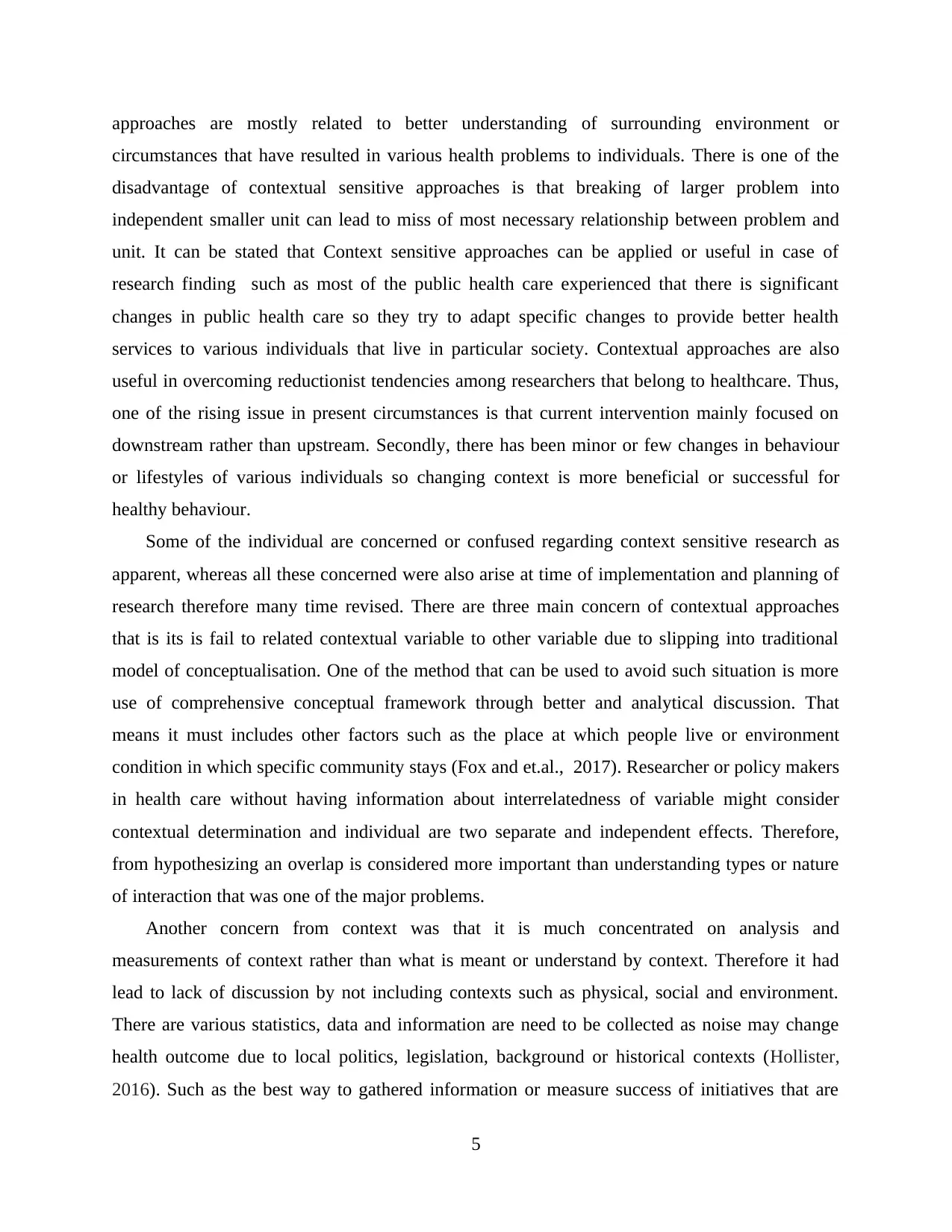
approaches are mostly related to better understanding of surrounding environment or
circumstances that have resulted in various health problems to individuals. There is one of the
disadvantage of contextual sensitive approaches is that breaking of larger problem into
independent smaller unit can lead to miss of most necessary relationship between problem and
unit. It can be stated that Context sensitive approaches can be applied or useful in case of
research finding such as most of the public health care experienced that there is significant
changes in public health care so they try to adapt specific changes to provide better health
services to various individuals that live in particular society. Contextual approaches are also
useful in overcoming reductionist tendencies among researchers that belong to healthcare. Thus,
one of the rising issue in present circumstances is that current intervention mainly focused on
downstream rather than upstream. Secondly, there has been minor or few changes in behaviour
or lifestyles of various individuals so changing context is more beneficial or successful for
healthy behaviour.
Some of the individual are concerned or confused regarding context sensitive research as
apparent, whereas all these concerned were also arise at time of implementation and planning of
research therefore many time revised. There are three main concern of contextual approaches
that is its is fail to related contextual variable to other variable due to slipping into traditional
model of conceptualisation. One of the method that can be used to avoid such situation is more
use of comprehensive conceptual framework through better and analytical discussion. That
means it must includes other factors such as the place at which people live or environment
condition in which specific community stays (Fox and et.al., 2017). Researcher or policy makers
in health care without having information about interrelatedness of variable might consider
contextual determination and individual are two separate and independent effects. Therefore,
from hypothesizing an overlap is considered more important than understanding types or nature
of interaction that was one of the major problems.
Another concern from context was that it is much concentrated on analysis and
measurements of context rather than what is meant or understand by context. Therefore it had
lead to lack of discussion by not including contexts such as physical, social and environment.
There are various statistics, data and information are need to be collected as noise may change
health outcome due to local politics, legislation, background or historical contexts (Hollister,
2016). Such as the best way to gathered information or measure success of initiatives that are
5
circumstances that have resulted in various health problems to individuals. There is one of the
disadvantage of contextual sensitive approaches is that breaking of larger problem into
independent smaller unit can lead to miss of most necessary relationship between problem and
unit. It can be stated that Context sensitive approaches can be applied or useful in case of
research finding such as most of the public health care experienced that there is significant
changes in public health care so they try to adapt specific changes to provide better health
services to various individuals that live in particular society. Contextual approaches are also
useful in overcoming reductionist tendencies among researchers that belong to healthcare. Thus,
one of the rising issue in present circumstances is that current intervention mainly focused on
downstream rather than upstream. Secondly, there has been minor or few changes in behaviour
or lifestyles of various individuals so changing context is more beneficial or successful for
healthy behaviour.
Some of the individual are concerned or confused regarding context sensitive research as
apparent, whereas all these concerned were also arise at time of implementation and planning of
research therefore many time revised. There are three main concern of contextual approaches
that is its is fail to related contextual variable to other variable due to slipping into traditional
model of conceptualisation. One of the method that can be used to avoid such situation is more
use of comprehensive conceptual framework through better and analytical discussion. That
means it must includes other factors such as the place at which people live or environment
condition in which specific community stays (Fox and et.al., 2017). Researcher or policy makers
in health care without having information about interrelatedness of variable might consider
contextual determination and individual are two separate and independent effects. Therefore,
from hypothesizing an overlap is considered more important than understanding types or nature
of interaction that was one of the major problems.
Another concern from context was that it is much concentrated on analysis and
measurements of context rather than what is meant or understand by context. Therefore it had
lead to lack of discussion by not including contexts such as physical, social and environment.
There are various statistics, data and information are need to be collected as noise may change
health outcome due to local politics, legislation, background or historical contexts (Hollister,
2016). Such as the best way to gathered information or measure success of initiatives that are
5
Paraphrase This Document
Need a fresh take? Get an instant paraphrase of this document with our AI Paraphraser
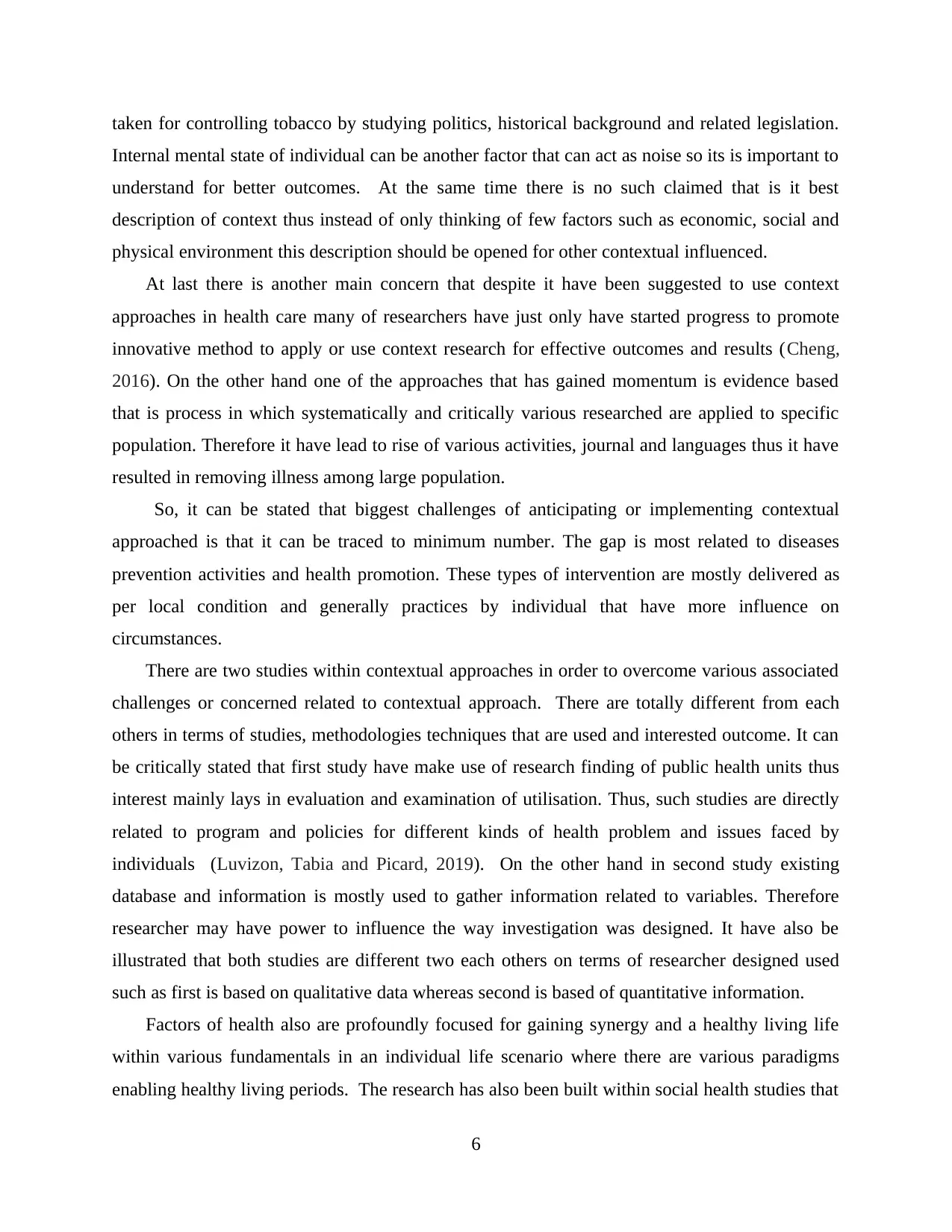
taken for controlling tobacco by studying politics, historical background and related legislation.
Internal mental state of individual can be another factor that can act as noise so its is important to
understand for better outcomes. At the same time there is no such claimed that is it best
description of context thus instead of only thinking of few factors such as economic, social and
physical environment this description should be opened for other contextual influenced.
At last there is another main concern that despite it have been suggested to use context
approaches in health care many of researchers have just only have started progress to promote
innovative method to apply or use context research for effective outcomes and results (Cheng,
2016). On the other hand one of the approaches that has gained momentum is evidence based
that is process in which systematically and critically various researched are applied to specific
population. Therefore it have lead to rise of various activities, journal and languages thus it have
resulted in removing illness among large population.
So, it can be stated that biggest challenges of anticipating or implementing contextual
approached is that it can be traced to minimum number. The gap is most related to diseases
prevention activities and health promotion. These types of intervention are mostly delivered as
per local condition and generally practices by individual that have more influence on
circumstances.
There are two studies within contextual approaches in order to overcome various associated
challenges or concerned related to contextual approach. There are totally different from each
others in terms of studies, methodologies techniques that are used and interested outcome. It can
be critically stated that first study have make use of research finding of public health units thus
interest mainly lays in evaluation and examination of utilisation. Thus, such studies are directly
related to program and policies for different kinds of health problem and issues faced by
individuals (Luvizon, Tabia and Picard, 2019). On the other hand in second study existing
database and information is mostly used to gather information related to variables. Therefore
researcher may have power to influence the way investigation was designed. It have also be
illustrated that both studies are different two each others on terms of researcher designed used
such as first is based on qualitative data whereas second is based of quantitative information.
Factors of health also are profoundly focused for gaining synergy and a healthy living life
within various fundamentals in an individual life scenario where there are various paradigms
enabling healthy living periods. The research has also been built within social health studies that
6
Internal mental state of individual can be another factor that can act as noise so its is important to
understand for better outcomes. At the same time there is no such claimed that is it best
description of context thus instead of only thinking of few factors such as economic, social and
physical environment this description should be opened for other contextual influenced.
At last there is another main concern that despite it have been suggested to use context
approaches in health care many of researchers have just only have started progress to promote
innovative method to apply or use context research for effective outcomes and results (Cheng,
2016). On the other hand one of the approaches that has gained momentum is evidence based
that is process in which systematically and critically various researched are applied to specific
population. Therefore it have lead to rise of various activities, journal and languages thus it have
resulted in removing illness among large population.
So, it can be stated that biggest challenges of anticipating or implementing contextual
approached is that it can be traced to minimum number. The gap is most related to diseases
prevention activities and health promotion. These types of intervention are mostly delivered as
per local condition and generally practices by individual that have more influence on
circumstances.
There are two studies within contextual approaches in order to overcome various associated
challenges or concerned related to contextual approach. There are totally different from each
others in terms of studies, methodologies techniques that are used and interested outcome. It can
be critically stated that first study have make use of research finding of public health units thus
interest mainly lays in evaluation and examination of utilisation. Thus, such studies are directly
related to program and policies for different kinds of health problem and issues faced by
individuals (Luvizon, Tabia and Picard, 2019). On the other hand in second study existing
database and information is mostly used to gather information related to variables. Therefore
researcher may have power to influence the way investigation was designed. It have also be
illustrated that both studies are different two each others on terms of researcher designed used
such as first is based on qualitative data whereas second is based of quantitative information.
Factors of health also are profoundly focused for gaining synergy and a healthy living life
within various fundamentals in an individual life scenario where there are various paradigms
enabling healthy living periods. The research has also been built within social health studies that
6
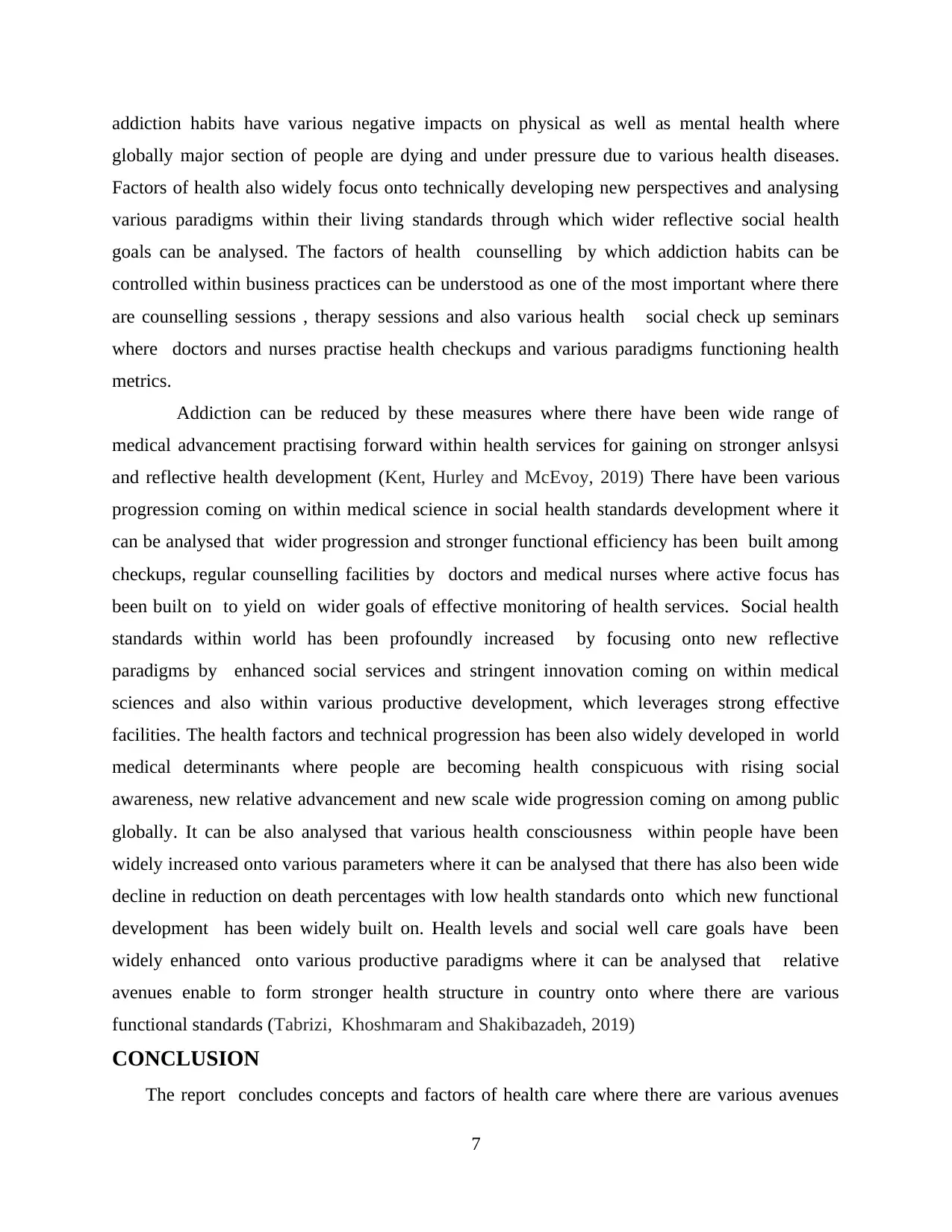
addiction habits have various negative impacts on physical as well as mental health where
globally major section of people are dying and under pressure due to various health diseases.
Factors of health also widely focus onto technically developing new perspectives and analysing
various paradigms within their living standards through which wider reflective social health
goals can be analysed. The factors of health counselling by which addiction habits can be
controlled within business practices can be understood as one of the most important where there
are counselling sessions , therapy sessions and also various health social check up seminars
where doctors and nurses practise health checkups and various paradigms functioning health
metrics.
Addiction can be reduced by these measures where there have been wide range of
medical advancement practising forward within health services for gaining on stronger anlsysi
and reflective health development (Kent, Hurley and McEvoy, 2019) There have been various
progression coming on within medical science in social health standards development where it
can be analysed that wider progression and stronger functional efficiency has been built among
checkups, regular counselling facilities by doctors and medical nurses where active focus has
been built on to yield on wider goals of effective monitoring of health services. Social health
standards within world has been profoundly increased by focusing onto new reflective
paradigms by enhanced social services and stringent innovation coming on within medical
sciences and also within various productive development, which leverages strong effective
facilities. The health factors and technical progression has been also widely developed in world
medical determinants where people are becoming health conspicuous with rising social
awareness, new relative advancement and new scale wide progression coming on among public
globally. It can be also analysed that various health consciousness within people have been
widely increased onto various parameters where it can be analysed that there has also been wide
decline in reduction on death percentages with low health standards onto which new functional
development has been widely built on. Health levels and social well care goals have been
widely enhanced onto various productive paradigms where it can be analysed that relative
avenues enable to form stronger health structure in country onto where there are various
functional standards (Tabrizi, Khoshmaram and Shakibazadeh, 2019)
CONCLUSION
The report concludes concepts and factors of health care where there are various avenues
7
globally major section of people are dying and under pressure due to various health diseases.
Factors of health also widely focus onto technically developing new perspectives and analysing
various paradigms within their living standards through which wider reflective social health
goals can be analysed. The factors of health counselling by which addiction habits can be
controlled within business practices can be understood as one of the most important where there
are counselling sessions , therapy sessions and also various health social check up seminars
where doctors and nurses practise health checkups and various paradigms functioning health
metrics.
Addiction can be reduced by these measures where there have been wide range of
medical advancement practising forward within health services for gaining on stronger anlsysi
and reflective health development (Kent, Hurley and McEvoy, 2019) There have been various
progression coming on within medical science in social health standards development where it
can be analysed that wider progression and stronger functional efficiency has been built among
checkups, regular counselling facilities by doctors and medical nurses where active focus has
been built on to yield on wider goals of effective monitoring of health services. Social health
standards within world has been profoundly increased by focusing onto new reflective
paradigms by enhanced social services and stringent innovation coming on within medical
sciences and also within various productive development, which leverages strong effective
facilities. The health factors and technical progression has been also widely developed in world
medical determinants where people are becoming health conspicuous with rising social
awareness, new relative advancement and new scale wide progression coming on among public
globally. It can be also analysed that various health consciousness within people have been
widely increased onto various parameters where it can be analysed that there has also been wide
decline in reduction on death percentages with low health standards onto which new functional
development has been widely built on. Health levels and social well care goals have been
widely enhanced onto various productive paradigms where it can be analysed that relative
avenues enable to form stronger health structure in country onto where there are various
functional standards (Tabrizi, Khoshmaram and Shakibazadeh, 2019)
CONCLUSION
The report concludes concepts and factors of health care where there are various avenues
7
⊘ This is a preview!⊘
Do you want full access?
Subscribe today to unlock all pages.

Trusted by 1+ million students worldwide
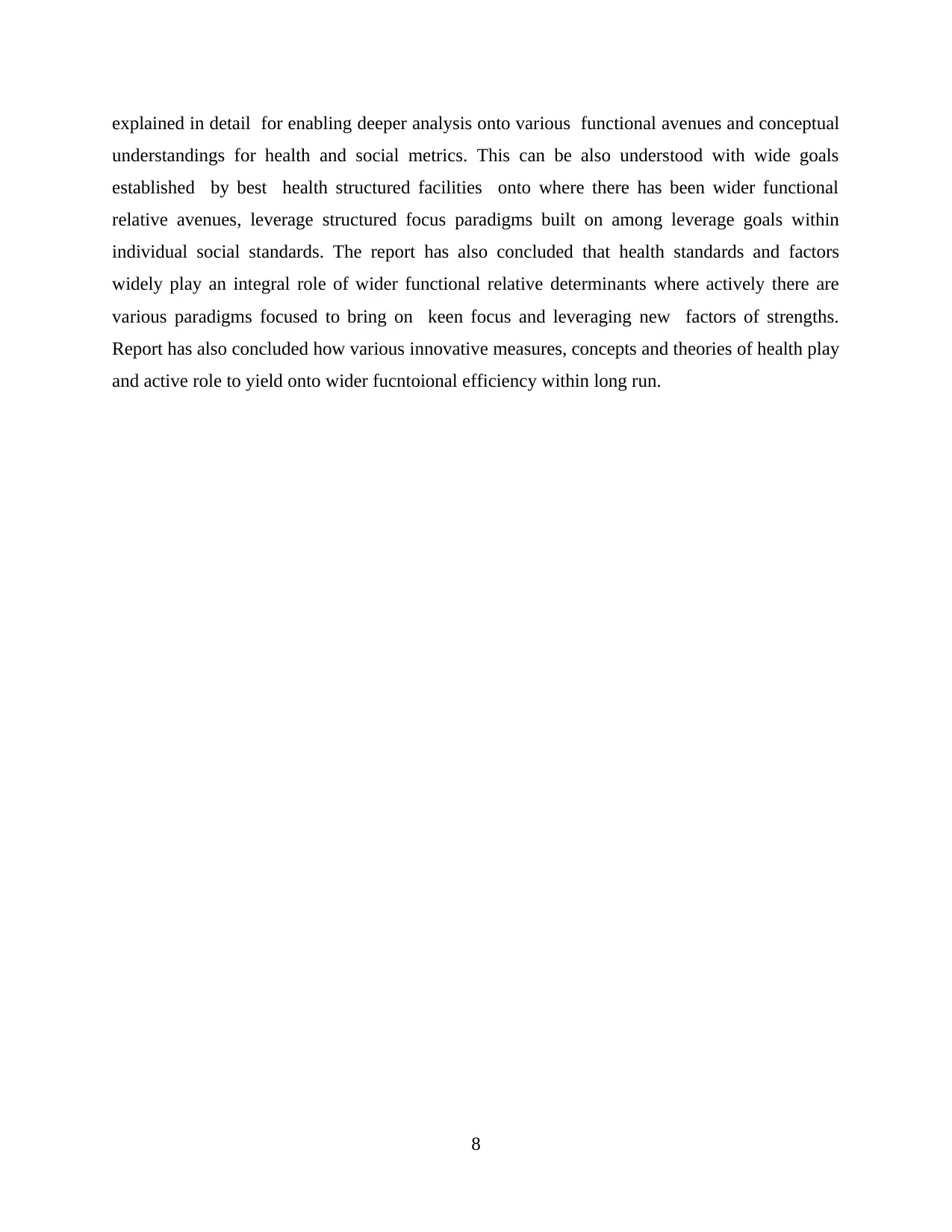
explained in detail for enabling deeper analysis onto various functional avenues and conceptual
understandings for health and social metrics. This can be also understood with wide goals
established by best health structured facilities onto where there has been wider functional
relative avenues, leverage structured focus paradigms built on among leverage goals within
individual social standards. The report has also concluded that health standards and factors
widely play an integral role of wider functional relative determinants where actively there are
various paradigms focused to bring on keen focus and leveraging new factors of strengths.
Report has also concluded how various innovative measures, concepts and theories of health play
and active role to yield onto wider fucntoional efficiency within long run.
8
understandings for health and social metrics. This can be also understood with wide goals
established by best health structured facilities onto where there has been wider functional
relative avenues, leverage structured focus paradigms built on among leverage goals within
individual social standards. The report has also concluded that health standards and factors
widely play an integral role of wider functional relative determinants where actively there are
various paradigms focused to bring on keen focus and leveraging new factors of strengths.
Report has also concluded how various innovative measures, concepts and theories of health play
and active role to yield onto wider fucntoional efficiency within long run.
8
Paraphrase This Document
Need a fresh take? Get an instant paraphrase of this document with our AI Paraphraser
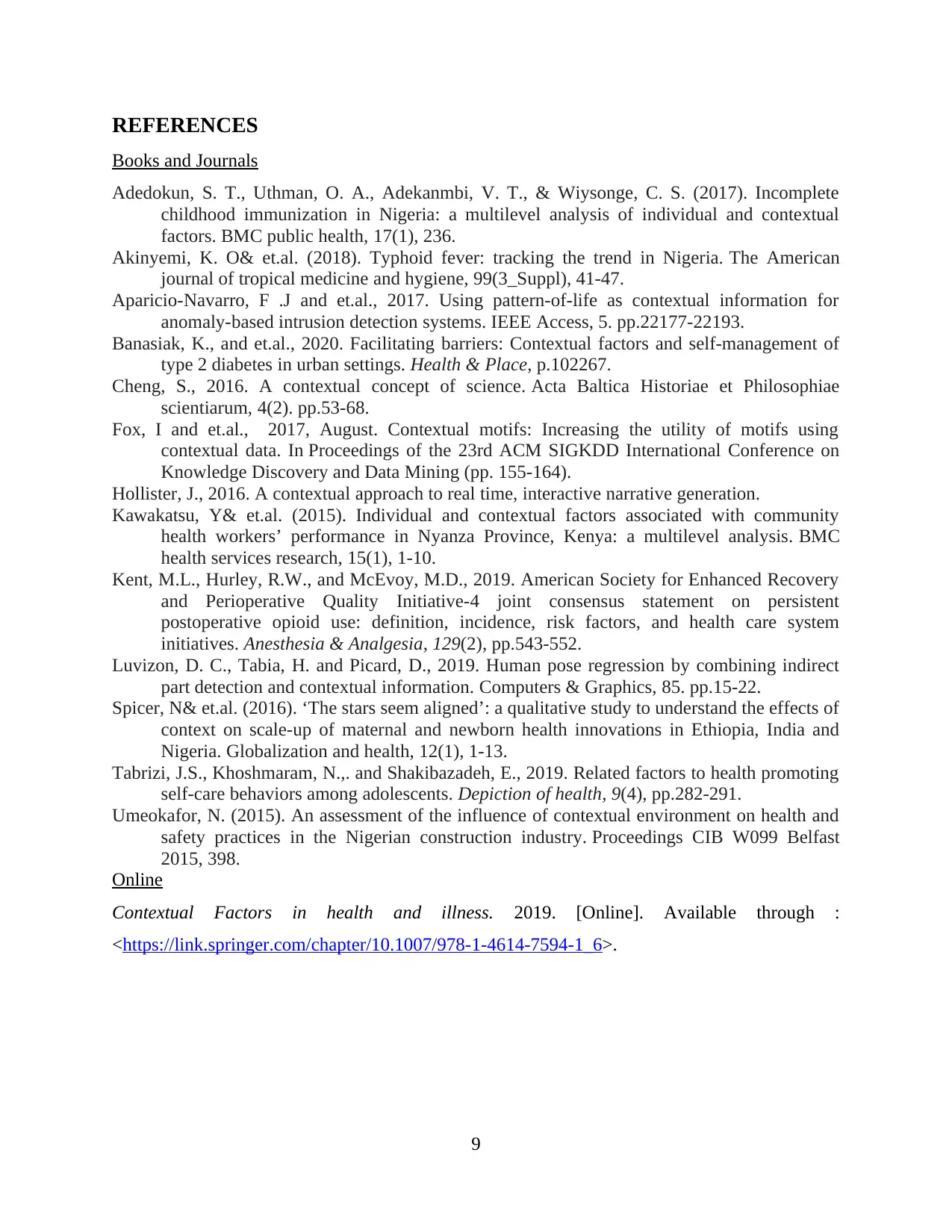
REFERENCES
Books and Journals
Adedokun, S. T., Uthman, O. A., Adekanmbi, V. T., & Wiysonge, C. S. (2017). Incomplete
childhood immunization in Nigeria: a multilevel analysis of individual and contextual
factors. BMC public health, 17(1), 236.
Akinyemi, K. O& et.al. (2018). Typhoid fever: tracking the trend in Nigeria. The American
journal of tropical medicine and hygiene, 99(3_Suppl), 41-47.
Aparicio-Navarro, F .J and et.al., 2017. Using pattern-of-life as contextual information for
anomaly-based intrusion detection systems. IEEE Access, 5. pp.22177-22193.
Banasiak, K., and et.al., 2020. Facilitating barriers: Contextual factors and self-management of
type 2 diabetes in urban settings. Health & Place, p.102267.
Cheng, S., 2016. A contextual concept of science. Acta Baltica Historiae et Philosophiae
scientiarum, 4(2). pp.53-68.
Fox, I and et.al., 2017, August. Contextual motifs: Increasing the utility of motifs using
contextual data. In Proceedings of the 23rd ACM SIGKDD International Conference on
Knowledge Discovery and Data Mining (pp. 155-164).
Hollister, J., 2016. A contextual approach to real time, interactive narrative generation.
Kawakatsu, Y& et.al. (2015). Individual and contextual factors associated with community
health workers’ performance in Nyanza Province, Kenya: a multilevel analysis. BMC
health services research, 15(1), 1-10.
Kent, M.L., Hurley, R.W., and McEvoy, M.D., 2019. American Society for Enhanced Recovery
and Perioperative Quality Initiative-4 joint consensus statement on persistent
postoperative opioid use: definition, incidence, risk factors, and health care system
initiatives. Anesthesia & Analgesia, 129(2), pp.543-552.
Luvizon, D. C., Tabia, H. and Picard, D., 2019. Human pose regression by combining indirect
part detection and contextual information. Computers & Graphics, 85. pp.15-22.
Spicer, N& et.al. (2016). ‘The stars seem aligned’: a qualitative study to understand the effects of
context on scale-up of maternal and newborn health innovations in Ethiopia, India and
Nigeria. Globalization and health, 12(1), 1-13.
Tabrizi, J.S., Khoshmaram, N.,. and Shakibazadeh, E., 2019. Related factors to health promoting
self-care behaviors among adolescents. Depiction of health, 9(4), pp.282-291.
Umeokafor, N. (2015). An assessment of the influence of contextual environment on health and
safety practices in the Nigerian construction industry. Proceedings CIB W099 Belfast
2015, 398.
Online
Contextual Factors in health and illness. 2019. [Online]. Available through :
<https://link.springer.com/chapter/10.1007/978-1-4614-7594-1_6>.
9
Books and Journals
Adedokun, S. T., Uthman, O. A., Adekanmbi, V. T., & Wiysonge, C. S. (2017). Incomplete
childhood immunization in Nigeria: a multilevel analysis of individual and contextual
factors. BMC public health, 17(1), 236.
Akinyemi, K. O& et.al. (2018). Typhoid fever: tracking the trend in Nigeria. The American
journal of tropical medicine and hygiene, 99(3_Suppl), 41-47.
Aparicio-Navarro, F .J and et.al., 2017. Using pattern-of-life as contextual information for
anomaly-based intrusion detection systems. IEEE Access, 5. pp.22177-22193.
Banasiak, K., and et.al., 2020. Facilitating barriers: Contextual factors and self-management of
type 2 diabetes in urban settings. Health & Place, p.102267.
Cheng, S., 2016. A contextual concept of science. Acta Baltica Historiae et Philosophiae
scientiarum, 4(2). pp.53-68.
Fox, I and et.al., 2017, August. Contextual motifs: Increasing the utility of motifs using
contextual data. In Proceedings of the 23rd ACM SIGKDD International Conference on
Knowledge Discovery and Data Mining (pp. 155-164).
Hollister, J., 2016. A contextual approach to real time, interactive narrative generation.
Kawakatsu, Y& et.al. (2015). Individual and contextual factors associated with community
health workers’ performance in Nyanza Province, Kenya: a multilevel analysis. BMC
health services research, 15(1), 1-10.
Kent, M.L., Hurley, R.W., and McEvoy, M.D., 2019. American Society for Enhanced Recovery
and Perioperative Quality Initiative-4 joint consensus statement on persistent
postoperative opioid use: definition, incidence, risk factors, and health care system
initiatives. Anesthesia & Analgesia, 129(2), pp.543-552.
Luvizon, D. C., Tabia, H. and Picard, D., 2019. Human pose regression by combining indirect
part detection and contextual information. Computers & Graphics, 85. pp.15-22.
Spicer, N& et.al. (2016). ‘The stars seem aligned’: a qualitative study to understand the effects of
context on scale-up of maternal and newborn health innovations in Ethiopia, India and
Nigeria. Globalization and health, 12(1), 1-13.
Tabrizi, J.S., Khoshmaram, N.,. and Shakibazadeh, E., 2019. Related factors to health promoting
self-care behaviors among adolescents. Depiction of health, 9(4), pp.282-291.
Umeokafor, N. (2015). An assessment of the influence of contextual environment on health and
safety practices in the Nigerian construction industry. Proceedings CIB W099 Belfast
2015, 398.
Online
Contextual Factors in health and illness. 2019. [Online]. Available through :
<https://link.springer.com/chapter/10.1007/978-1-4614-7594-1_6>.
9
1 out of 11
Related Documents
Your All-in-One AI-Powered Toolkit for Academic Success.
+13062052269
info@desklib.com
Available 24*7 on WhatsApp / Email
![[object Object]](/_next/static/media/star-bottom.7253800d.svg)
Unlock your academic potential
Copyright © 2020–2026 A2Z Services. All Rights Reserved. Developed and managed by ZUCOL.





